- Home
- Juliet Marillier
Twixt Firelight and Water Page 3
Twixt Firelight and Water Read online
Page 3
One moment I was standing by the dry-stone wall, feeding the horse by hand. The next I was flat on my back, held immobile in the grip of a spell. I could not move so much as my little finger. I looked up and into my mother’s eyes.
‘Where is he?’
There was only one feeling in me, and that was terror — not for myself, not for Ciarán, who should be well away by now, but for Lóch. I didn’t make a sound. I couldn’t have told my mother what she wanted anyway. The charm she had set on me made every breath a mountain to climb. Speak? Hardly.
‘Where is he, Conri? Tell me! Vanished in the night, his keepers said. A child of that age does not wander off on his own.’ Her face was a spectral white, her eyes wine-dark. Her voice scourged me. ‘Speak, Conri! What did you see? Who came? Which way did they go?’
I lay mute, staring up at her like a dullard who cannot understand plain words. With a very small part of my mind, the part I was able to shield, I willed Lóch not to come out and look for me.
‘What is the matter with you, wretched boy? While you tend to horses like a feeble-minded farmhand, and no doubt waste day after day on your endless hummings and tinklings, my son has disappeared from under your nose! You fool, Conri, you stupid, treacherous fool! Tell me! You must know! Tell me who has taken him!’ She relaxed her spell a little; she wanted me capable of speech.
If I lied, she would recognise it instantly. If I told the truth she would be off after them in the blink of an eye. My silence could win them precious time. I lay there, looking up at her, and spoke not a word.
‘Come.’ My mother clicked her fingers. Now I could move. I could move in one direction only, and that was after her. A good thing. She led me away from Lóch, away from the grandmother, away from the cottage and into the forest. She led me, a dog on an invisible chain, across the margin and into the Otherworld. We stood in the shade of the oaks, the sorceress and I, and in my mind I offered an apology to my little brother, and another to his father, and my regrets to the two hard-faced men who were Ciáran’s half-brothers. I had not particularly liked them, but I had respected them. I had seen the bonds of family there, a phenomenon previously unknown to me. I hoped those bonds were strong enough to withstand a sorceress’s fury.
‘Very well, Conri.’ My mother’s face was calm now. She knew I could not run, not with her spell on me. She knew how easily I had bent and broken before her punishments in the years of my growing to a man. ‘I can ensure you never set your fingers to the harp strings again. I can turn you into a twisted, crippled apology for a man. I can do this between one breath and the next. There is one way you can save yourself, and that is by telling me what you know. Now, Conri. Right now.’
My heart thudded like a war drum; my skin broke out in cold sweat. She didn’t know about Lóch. Somehow, all summer long, she had been so engrossed in her new project, honing her human weapon, that she had taken her eyes right off me. She had not seen that I had fallen in love. She had threatened my hands; she had threatened my body. She had not used the threat that I most feared. Oh gods, if only I could be strong, both Ciarán and Lóch might be spared my mother’s wrath.
I drew a deep breath. ‘I know nothing,’ I said. ‘Nothing at all.’
I expected pain, and she delivered it. I put my teeth through my lip; I bloodied my palms with my nails. At a certain point I lost control of my bladder, ruining my wedding clothes. The sun rose higher. The Lugnasad ritual would be starting, and Lóch would be cross with me. I tried not to think of her. The most probing, the most penetrating charm my mother could devise must never find the small, safe place where my dear one was hidden, deep in my heart.
My mother must soon come to believe I had nothing to tell her, surely. I had never held out so long before. Always, eventually, I had delivered what she wanted once the punishment reached a certain level. Back then, I had not had Lóch to think of. Or my brother. I was starting to understand about family. As I writhed, I allowed hope in. Soon she’ll give up on me. She’ll leave me here and head off to wherever she gave birth to him, and I can creep back over the margin. Lóch will forgive me. We can be wed tomorrow ...
The sun rose higher still. The harvest ritual would be over; the folk of the village would be celebrating with mead and games. Lóch would be upset, worried.
Through the tears and blood and sweat I saw a change in my mother’s eyes. She became very still, so still that only a person familiar with all her moods, as I was, would have realised what fury possessed her. ‘You know something,’ she said. ‘You have lied to me; you have held something back. I cannot wait any longer, Conri. Someone’s taken my jewel, my treasure, my son. Not his father; I left that man fit for nothing but dribbling into his beard. It will have been one of the brothers. They’ll have taken him back to Sevenwaters, thinking to hide him in the nemetons. Fools. Not one of them can outpace me, outride me, outwit me.’
I thought of Ciarán. Might not my exceptional little brother and his formidable kinsmen stand strong even against her? Hold your silence, Conri. I was almost beyond speech anyway. My lip was split; my jaw was on fire. Every part of me hurt. I was glad Lóch could not see me.
‘I knew you’d never amount to much,’ my mother said, and one elegantly-shod foot came out to deliver a casual kick in the ribs.
And then, ah then, when she might have headed off on her quest and left me lying, a pathetic bundle of rags and bloodied, filthy flesh splayed amongst the hard roots of a great oak, I had to open my mouth, didn’t I? I had to speak. Fool. Bitter, hopeless fool. ‘In the end,’ I whispered, ‘Ciarán will turn against you. He will defeat you. I know it.’ And I did, though how, I could not have said. Not magic. Not the Sight. But deep in the bone, I knew.
Looking in her eyes, beyond terror, I believed she would kill me. I was wrong. I believed she would find Lóch and destroy her. I was wrong there, too. What my mother did was set a geis on me.
‘Conri son of Oonagh,’ she said, raising both hands so the full sleeves of her robe spread out like wings, the fine blue fabric rippling in the forest breeze, ‘you will pay the price for your disobedience!’
I was starting to feel very odd, as if the aching in my joints, the nausea, the burning and stinging and tearing sensations had been only a prelude to the grand tune of the day. Now I itched all over. My skin began to sprout like a field of new-sown wheat, save that this crop was night-black. My lips pushed forward, tightened, hardened; my throat began to close up. My limbs shrivelled. A twisted cripple of a man ... She was doing it. She would make me a man unfit to wed, unable to earn a living ... Lóch loves you, Conri. Hold onto that. She will love you no matter what kind of monster you become. Gods! I was shrinking, changing, my clothing falling off me, my feet becoming ... my feet becoming ... claws ...
‘From this day forth, Conri, take the form of a raven! You will live in this bodily shape, but your mind will remain that of a man. Every moment you will understand what your life might have been, had you not chosen to defy me!’
Raven. I was a raven. A dazzle of colour assaulted my eyes; all was light. Tiny sounds came clear to me from high in the canopy: chirp, rustle, whisper. I turned my head one way and the other, and the dizziness made me stagger on my splayed bird-feet. No wonder my skin itched so. I had sprouted feathers.
‘Fifteen years will you live thus, as a wild creature. When those fifteen years are done you will regain the form of a man. You’d best live solitary, Conri. For should any man or woman know who you are, should anyone at all recognise you as the man who dared thwart me, or as my son, or as Ciáran’s half-brother, or as the fellow who used to play the harp in these parts, should anyone know you and call you by your name before those fifteen years are up, you will be condemned to stay in that form —’ She paused, the word forever trembling on her lips. Perhaps the knowledge that we were kin stopped her; or perhaps she simply wanted to make this more entertaining, as is the nature of geasa generally. She was nothing if not inventive. ‘Until a woman agrees to marry you in your
bird shape,’ she said. And after a pause for reflection, ‘A woman of that family. The Sevenwaters family.’ There was an unpleasant smile on her lips, a smile that told me how likely such a means of salvation must be. ‘None of them would ever agree,’ she added. ‘Not after what I did to them. The shadow of it will hang over generation on generation. Make sure nobody knows you, Conri. Fly away, foolish musician, fly far, far away. And never meddle in my affairs again.’
Cursed to remain in raven form
I left Lóch on our wedding morn.
No word could speak, no story tell.
My life became not heav’n, but hell.
My mother could hardly have pronounced a crueler geis if she had known all about Lóch and our plans for the future. Fifteen years. In fifteen years’ time, Lóch would be well past the safe age for childbearing. In fifteen years, her grandmother would be gone. For all that time I’d be incapable of providing for anyone but myself. Worse still, I had no way to explain to Lóch what had happened; why I had vanished on our wedding day with not a word, not a sign, not a clue. I could not even watch over her. There were only two people in the world, barring my mother, who I believed might recognise me in the form of a raven. One was my clever little brother. The other was the woman who loved me. If I were ever to be a man again, and if Lóch were ever to be my wife, I must keep out of her sight for fifteen years.
I stayed close, but not too close. And so I watched as it unfolded, the disaster I had brought down on the one I loved. The cottage was already promised; the cow was already sold. Lóch and her grandmother waited a while for me, relying on the hospitality of friends. The grandmother thought I had bolted, suddenly frightened of the responsibilities of marriage. Lóch refused to believe it. Some harm had come to me, she said; but I was strong and courageous, and eventually I would make my way back to her. I would have wept at that, if I could.
When others were growing weary of housing the two of them, they took up the old plan and headed north. I followed, unable to do more than keep an eye on them, but finding it impossible to leave. Lóch looked sad and tired; the grandmother was stoical, tending to the horse, finding firewood, saying little. I made an error, coming too close one day when I saw Lóch weeping by the fire, her head in her hands, her lovely shining hair lank and lifeless across her shoulders. She had taken off her boots. Her feet were red with blisters. Perched on a branch nearby, I was startled when she raised her head suddenly and looked straight at me.
‘You again,’ she said, and smiled. I was possessed by the longing to wing down and alight beside her, to feel the gentle touch of her hand, to offer what comfort I could. But I saw in her eyes that I had already come too close. My broken heart cracked anew as I spread my wings and flew away, away, where there was no chance that she would see me. I could offer her nothing at all.
* * * *
Fifteen years. Lóch and I were seventeen when the geis was set on me; its term was almost our whole lives again. My imagination, trapped inside my bird form, ran riot with what could happen in such a time. I was a bard; I conjured up tragedies of a grand and entertaining nature. Well, I have said already that my tale was a sad one, and that much was true. Grand and entertaining, no. Just full of helpless, useless tears.
From this point on, it is short enough to tell. The early years passed. Lóch’s grandmother died within two winters of my transformation, carried off by an old people’s sickness, a cough, a loss of appetite, a quick fading. They had given up the search for their kinsfolk when the horse could not manage the distance, and had instead established themselves in a tumbledown hut abandoned by earlier tenants who perhaps feared the encroaching forest with its shadowy strangeness, its mysterious night time noises. Lóch eked out a living. She turned her hand to whatever tasks the season demanded, helping local farmers with haymaking or pear-picking or minding children. I could not leave her; it would have been like cutting out half my soul. I lived in the woods near her little house, making sure I saw but was not seen. I learned the habits of a wild creature. Sometimes it seemed to me I was losing myself, becoming more raven than man, until I saw Lóch coming home, a slight, purposeful figure, thinner now, the gentle curve of her cheek turned to a sharper line, her gaze watchful. On her own, living so far from other dwellings, she had an eye out for the perils one might expect in such a situation, and once or twice I saw her drive off a foolish fellow with her pitchfork. She was waiting for me. Four years on, five years on, she was still waiting.
I never saw my mother. I tried not to think of her, but bitterness grew in me with every passing season. I wondered if she had found Ciarán, or whether my silence, maintained at so great a cost, had won my little brother freedom and a place in the heart of his family. I felt some pangs of jealousy. Under the circumstances, that was not unreasonable. I began to understand how resentment and fury could drive a person mad. I did not want any insights into my mother’s mind, but they came to me anyway. If I had possessed the means to destroy her I would have done it without a second thought. The wide-eyed bard who had fallen in love with a girl between firelight and water was no more. The raven was a different creature. With every passing year, some of my mother’s darkness crept into my spirit.
You could imagine, I suppose, various endings to the tale of Lóch and Conri. I have said already that it did not follow the path of happy ever after. I watched her; she waited for me. By the time ten years had passed, Lóch had cleared a good-sized area around her cottage and established a garden, in which she grew not only vegetables for her own use, but a variety of herbs. She had taught herself certain healing skills, and received frequent visits from folk in search of simples. My love had a circle of friends and was no longer alone. She had admirers, too, men whom I hated for the way they looked at her, but she refused every offer of marriage. I dared not come close enough to hear what she said to them, but I imagined it. I will not wed. I’m waiting for my sweetheart to come home. After ten years, folk must have found this more than a little odd.
It happened in summer, late in the afternoon. Lóch had been working in the garden, and I watching her from a position high in the boughs of an oak, well screened from her sight. I loved the lines and curves of her body in the practical homespun she wore. I could see how time was changing her, but for me she would always be the perfect creature I had seen that very first night, the fire on her face, the moon at her back, the woman who had looked at me and made my heart hers in an instant.
Lóch had a work table outdoors, a place where she could enjoy the sun while preparing vegetables for the pot or herbs for drying. I gazed down from my branch, and it seemed to me every movement she made was a poem, and every glance from her weary eyes was a song. She lost her balance, her ankle turning as she trod on a stone. The knife in her hand slipped. I heard her cry out, and I saw the blood flowing from her arm, a crimson stream, welling, spurting ... Lóch snatched up a cloth, pressed it against the red tide. The cloth filled with blood, the stream dyed her gown, her face went ashen pale. She fell to her knees, too weak to hold the staunching rag in place. So quick, oh, gods, so quick ...
I flew to her, bird-heart rattling in bird-breast, dark wings beating a panic song, shock driving the geis right out of my consciousness. I tried to help her. I tried, I tried. Where were my human hands that could press the cloth hard against the ebbing life? Where was my human voice that could shout for help? Where was my human strength, so I could pick her up and run to the nearest house? Gone, all gone. Nothing I could do would save her.
Lóch lay where she had fallen, her sweet features filmed with sweat, her skin pale as moonlight. With a fold of cloth held in my beak, witness of my futile attempt to stem the flow of blood, I stood by her right shoulder, my bird-eyes fixed on hers. Beloved. Oh, beloved.
She tried to speak; her lips moved, searching for words. I remembered the geis then, and cared nothing at all for it. Lóch was dying; I could not help her. I had failed her. If she was gone it mattered nothing whether I lived or died, whether I w
as bird or man. Without her I had no life. In that moment, all I wanted was that she look at me and know me, know that I had kept faith all these years, as she had. Know that I had not deserted her; know that I loved her still.
A film was creeping over her eyes; her breath faltered. Oh, Lóch. Don’t leave me. Don’t leave me all alone. I love you. More than the moon and stars, more than the pure notes of the harp, more than the whole world. Lóch. Lóch, my love.
She snatched a rasping breath. The dying eyes turned on me, sweet and steadfast as always. ‘Conri,’ she whispered. ‘I knew you’d come.’ And she was gone.
* * * *
There was a long time in the wilderness. Heedless of danger, caring nothing if I lived or died, I came close to starving myself, and closer to killing myself by other means, but the fey part of me made that a harder task than it might have been. As for the geis, it was no longer of any significance. I’d be a bird forever. What did that matter? I had nothing. I had nobody. I was less a raven than a festering mass of bitterness and sorrow, and if I became a man again, I did not think I would be a man worth knowing. So I wandered, and the years passed. I never took a mate; I never kept company with other ravens, for wild birds shunned me, sensing my difference. All feared me: man, the predator. Hah! If only they knew what a helpless, hopeless creature I truly was. If Lóch had not loved me, she would by now be happily wed, with children half-grown. She’d have a man who could warm her bed and provide for her. Loving me had destroyed her.

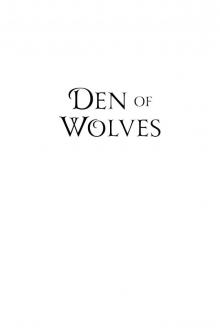 Den of Wolves
Den of Wolves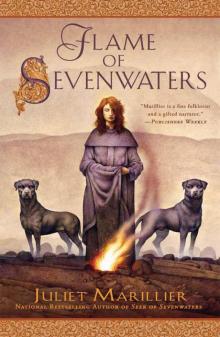 Flame of Sevenwaters
Flame of Sevenwaters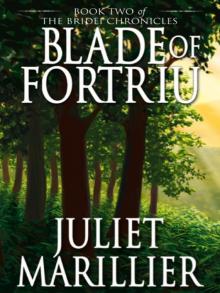 Blade of Fortriu
Blade of Fortriu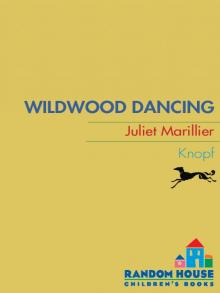 Wildwood Dancing
Wildwood Dancing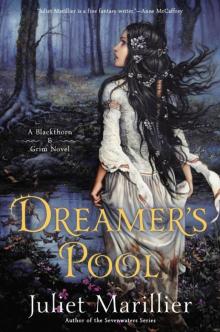 Dreamer's Pool
Dreamer's Pool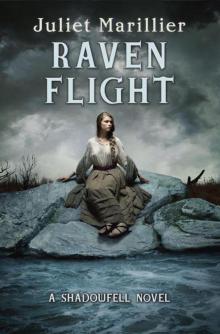 Raven Flight
Raven Flight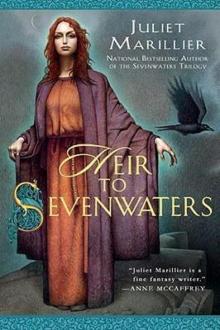 Heir to Sevenwaters
Heir to Sevenwaters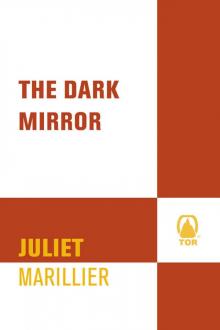 The Dark Mirror
The Dark Mirror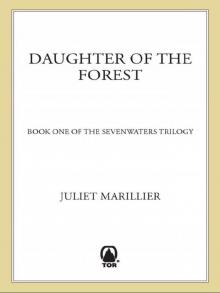 Daughter of the Forest
Daughter of the Forest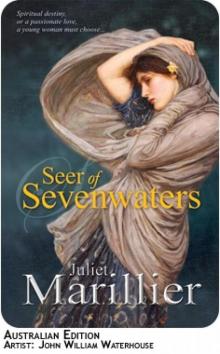 Seer of Sevenwaters
Seer of Sevenwaters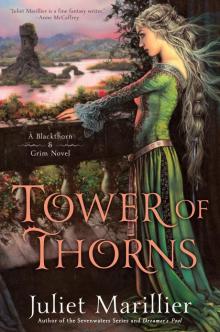 Tower of Thorns
Tower of Thorns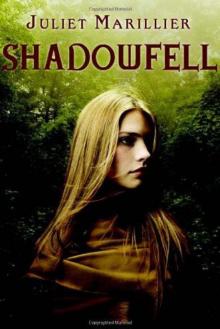 Shadowfell
Shadowfell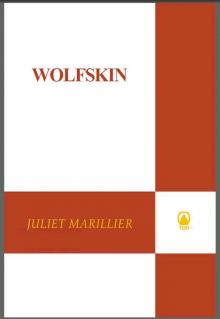 Wolfskin
Wolfskin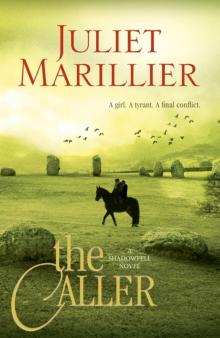 The Caller
The Caller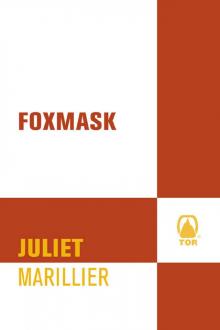 Foxmask
Foxmask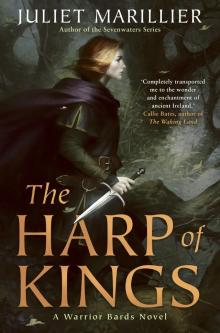 Harp of Kings
Harp of Kings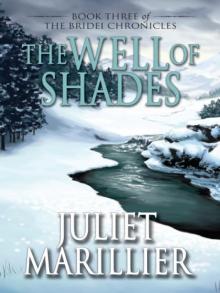 The Well of Shades
The Well of Shades Heart's Blood
Heart's Blood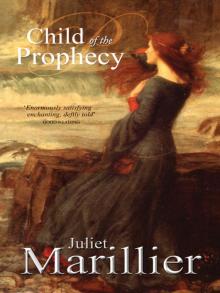 Child of the Prophecy
Child of the Prophecy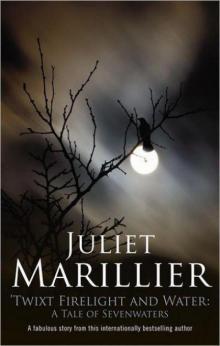 Twixt Firelight and Water
Twixt Firelight and Water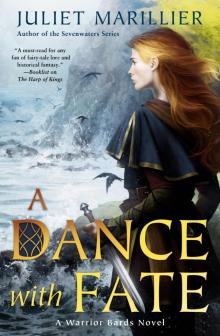 A Dance with Fate
A Dance with Fate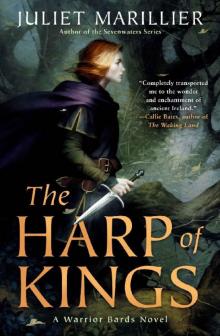 The Harp of Kings (Warrior Bards)
The Harp of Kings (Warrior Bards)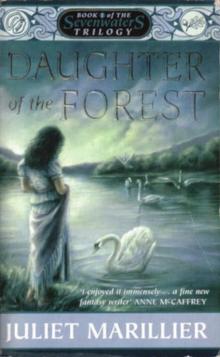 Daughter of the Forest (The Sevenwaters Trilogy)
Daughter of the Forest (The Sevenwaters Trilogy)![Sevenwaters [06] Flame of Sevenwaters Read online](http://i1.bookreadfree.com/i2/04/08/sevenwaters_06_flame_of_sevenwaters_preview.jpg) Sevenwaters [06] Flame of Sevenwaters
Sevenwaters [06] Flame of Sevenwaters![[Sevenwaters 04] Heir to Sevenwaters Read online](http://i1.bookreadfree.com/i2/04/12/sevenwaters_04_heir_to_sevenwaters_preview.jpg) [Sevenwaters 04] Heir to Sevenwaters
[Sevenwaters 04] Heir to Sevenwaters